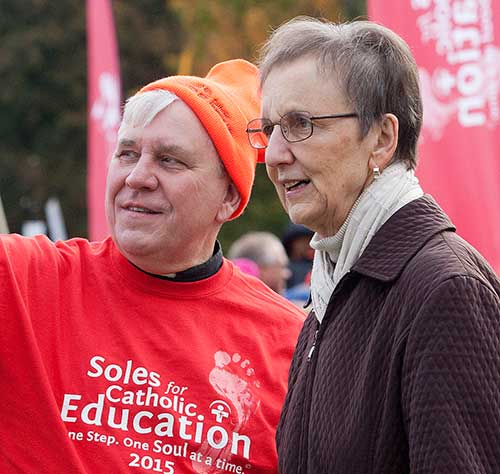KATHLEEN CEPELKA
SUPERINTENDENT OF SCHOOLS
As we approach Catholic Schools Week 2020 and celebrate the many ways in which our schools contribute to the overall advancement of society, we also consider and give thanks for the holistic formation they provide for students as unique individuals, created in the image of God.

Archbishop Jerome E. Listecki and Dr. Kathleen Cepelka, superintendent for schools, chat during the 2015 Soles for Catholic Education walk at Mount Mary University.
Catholic schools have been focused on educating the whole person long before “whole-child education” was popular educational terminology. In the 1950s and 1960s, for example, a period usually considered to be the high point of Catholic education in the United States, Catholic school elementary and secondary students were expected to succeed in the core academic content areas, to develop skills in art and music, to be physically active and resilient, to develop basic leadership skills through school and neighborhood involvements, and to cultivate a mindset that included concern for their brothers and sisters around the world. Although resources and methods were primitive by today’s standards, every effort was made to ensure that children were developing spiritually, intellectually, morally and socially. Continuing that long tradition of holistic and wholesome education, every program, course of study, activity and service developed or sponsored by our Catholic schools today is aimed at furthering the growth of each student in Christ and making disciples of all.
To guide us in the fulfillment of that mission, in 2012 we established the National Standards and Benchmarks for Effective Catholic Schools, catholicschoolstandards.org, as the single unifying framework for all programs, projects. and planning related to Catholic education in the Archdiocese of Milwaukee including, but not limited to, school accreditation, the Archdiocesan Exemplary Recognition Program, the Teacher Effectiveness Framework, school improvement planning, and teacher and principal evaluations.
Specifically, the 2019 – 2020 Vision for Catholic Education in the Archdiocese of Milwaukee is based on the eight Defining Characteristics of Effective Catholic Schools as derived from the Catholic Schools Standards project referenced above:
Centered in the Person of Jesus Christ
Every Catholic school in the Archdiocese of Milwaukee will exemplify the fact that the Gospel is the most important lesson taught and lived in its midst.
Evangelizing with the Church
As Catholic school leaders, teachers, and staff members in the Archdiocese of Milwaukee, we will be mindful of our essential role in furthering the teaching mission of the Church and our inter-relatedness with each other in that work.
Distinguished by Excellence
We will be tireless in striving for the ideal in every aspect of our ministry. For us, “good enough” will never be “good enough.”
Committed to Educate the Whole Child
Every student in our schools should be treated like a family member, called by name, and called by name or otherwise personally recognized at least once each day.
Accessible to All Students
All schools will set target goals for increasing the enrollment of minority populations in 2020-21.
Steeped in a Catholic Worldview
Catholic Social Teachings will be explicitly taught and integrated into every content area, discipline and program in our schools.
Sustained by Gospel Witness
We will “sustain our mission” by daily personal prayer and reflection, remembering that we can only give to others what we possess and value ourselves.
Shaped by Communion and Community
“See how they love one another” will be the first observation by every visitor to our schools.
Thus, the mission of the Archdiocese of Milwaukee, to “Proclaim Christ and Make Disciples through the Sacramental life of the Church,” is at the heart of our ministry in the Office for Schools. Everything we do is aimed toward “making disciples of all.”
St. Elizabeth Ann Seton, patroness of Catholic schools, pray for us!
